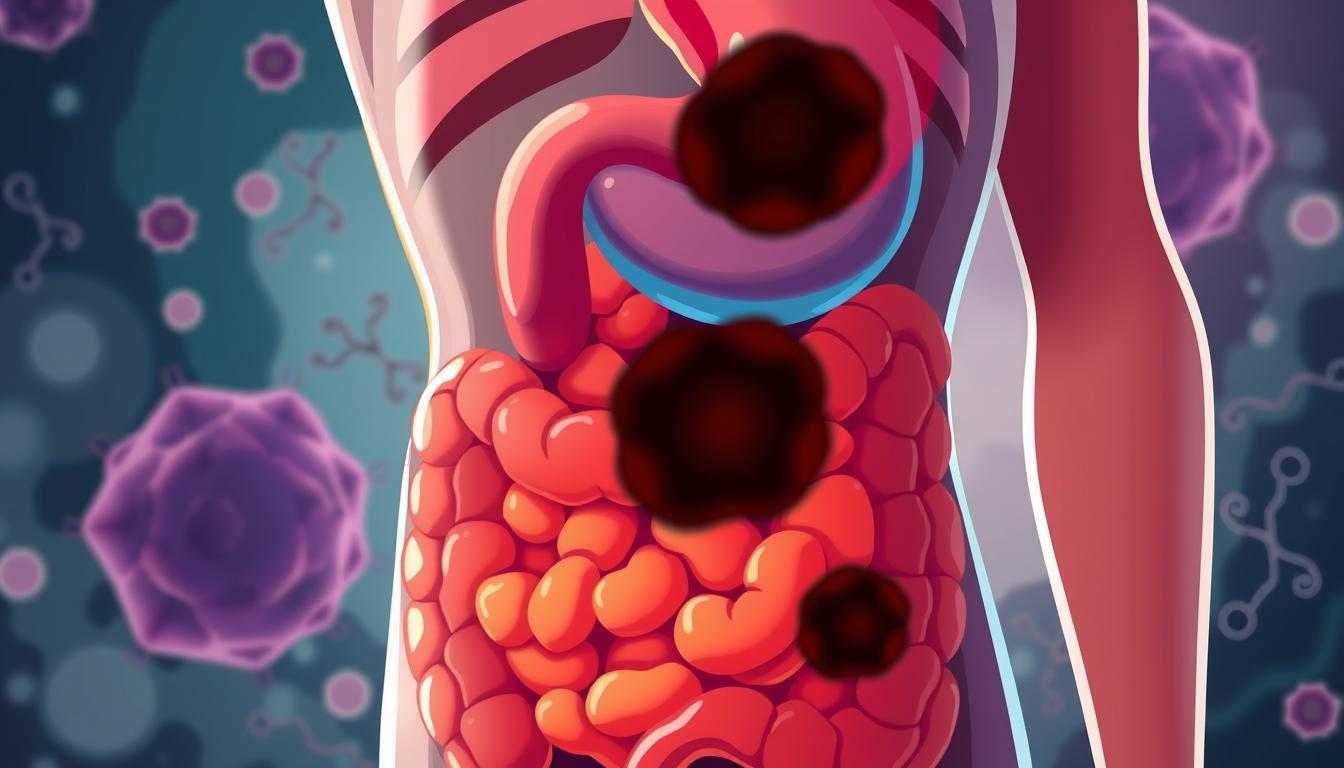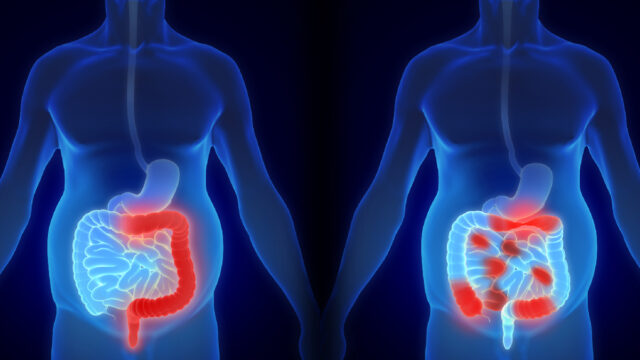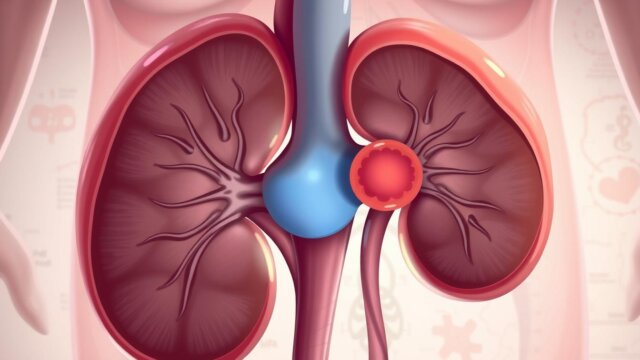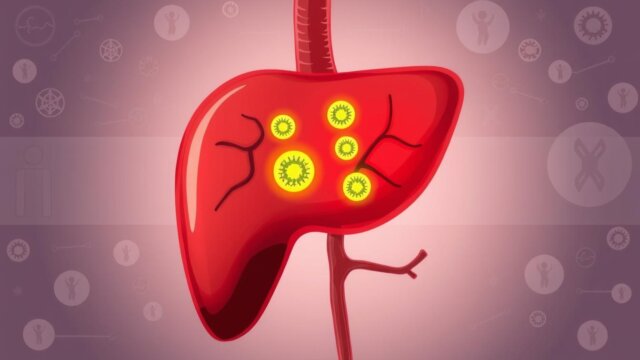FTC disclaimer: This post may contains affiliate links and we will be compensated if you click on a link and make a purchase.
More than 90% of people treated for early-stage colon cancer were alive five years after diagnosis. This shows how much progress we’ve made in fighting this common disease. Colon cancer, also known as colorectal cancer or intestinal cancer, is the third most common cancer in the U.S. It affects both older adults and more and more young people.
It’s important to know the symptoms, how to diagnose it, and the treatment options. This helps catch it early and manage it well.
Key Takeaways
- Colon cancer is the third most common cancer in the U.S., affecting both older adults and a growing number of younger individuals.
- Early detection and treatment can significantly improve survival rates, with over 90% of people treated for early-stage colon cancer alive five years after diagnosis.
- Effective treatments have been developed that can target and manage colon cancer, leading to improved outcomes.
- Regular screening, lifestyle changes, and understanding risk factors are important for reducing the risk of colon cancer.
- Palliative care can help manage symptoms and side effects for individuals with advanced colon cancer.
Understanding Intestinal Cancer
Intestinal cancer, also known as colorectal cancer, starts in the colon or rectum. Most cases start in the small intestine’s lining, mainly in the duodenum. There are many types, like adenocarcinomas and carcinoid tumors.
Types of Intestinal Cancer
Colon and rectal cancers are the most common types. They can happen in different parts of the digestive tract. However, they share many risk factors and treatments.
Risk Factors and Causes
Older age and black race can increase your risk. So can a family history of cancer or polyps. Other factors include a bad diet and smoking.
Colon cancer starts when cells in the colon change and grow fast.
Risk Factors for Intestinal Cancer | Causes of Intestinal Cancer |
|---|---|
| Colon cancer develops when cells in the colon acquire changes in their DNA, causing the cells to multiply rapidly and form a tumor that can invade and destroy healthy tissue. |
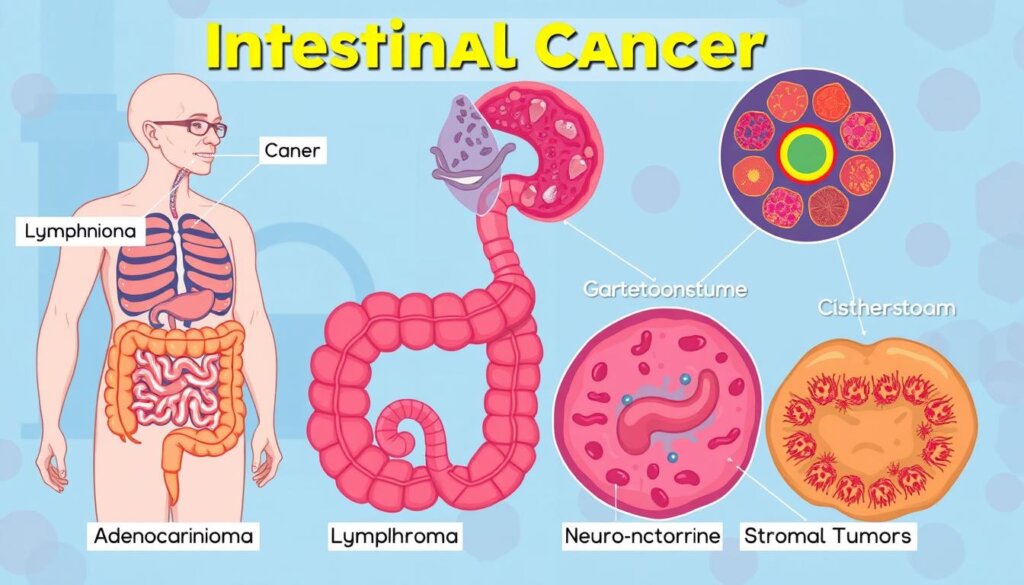
“Intestinal cancer is a rare type of cancer, but factors like a high-fat diet, Crohn’s disease, and a history of polyps can increase the risk.”
Symptoms of Intestinal Cancer
Many people with intestinal cancer don’t notice symptoms at first. When symptoms do show up, they might include changes in bowel habits. This can be more frequent diarrhea or constipation. Also, rectal bleeding or blood in the stool, ongoing discomfort in the belly area, and a feeling that the bowel doesn’t empty completely are symptoms.
Colorectal or colon cancer might not cause symptoms right away. In many cases, people who have symptoms don’t have cancer. Symptoms of rectal cancer can include a change in bowel habits lasting for more than a few days. Also, rectal bleeding, abdominal pain, fatigue, and unexplained weight loss are symptoms.
While these symptoms can be caused by various conditions, it’s important to report any persistent symptoms to a healthcare provider. Early detection through screening can make intestinal cancer easier to treat.
Symptom | Description |
|---|---|
Change in bowel habits | Diarrhea, constipation, or stool narrowing can be a symptom of intestinal cancer. |
Rectal bleeding | Bright red blood in the stool may indicate intestinal cancer. |
Blood in the stool | Blood in the stool can be a symptom of intestinal cancer. |
Abdominal pain | Cramping or abdominal pain can be associated with intestinal cancer. |
Weakness and fatigue | Weakness and fatigue can be symptoms of intestinal cancer. |
Unintended weight loss | Unexplained weight loss can be a symptom of intestinal cancer. |
It’s important to remember that many of these symptoms can be caused by conditions other than cancer. This includes infection, hemorrhoids, or irritable bowel syndrome. If you experience any persistent or concerning symptoms, it’s best to consult with your healthcare provider for proper evaluation and diagnosis.
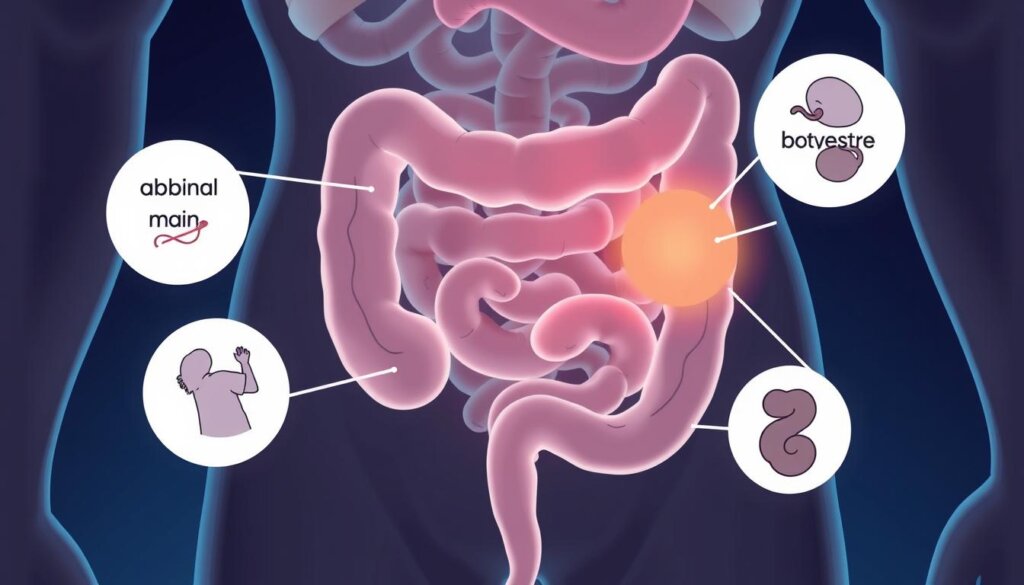
Diagnosing Intestinal Cancer
Diagnosing intestinal cancer starts with a detailed check-up and looking at your health history. Your doctor will ask about any symptoms you’ve noticed. This might include changes in bowel movements, stomach pain, or unexpected weight loss.
Colonoscopy and Other Tests
A colonoscopy is the main tool for finding intestinal cancer. It uses a long, flexible tube with a camera to look at the colon and rectum. This helps doctors find any unusual growths and take a biopsy for more tests.
Other tests might include blood tests and imaging scans. These can help confirm the cancer diagnosis.
Staging of Intestinal Cancer
After confirming cancer, doctors will figure out its stage. Staging is key for choosing the right treatment. The stages range from 0 to 4, with 0 being the cancer is only in the innermost layer of the intestinal wall.
Staging tests might include more scans to see how far the cancer has spread.
Stage | Description |
|---|---|
Stage 0 | The cancer is confined to the innermost layer of the intestinal wall. |
Stage 1 | The cancer has grown into the deeper layers of the intestinal wall but has not spread to the lymph nodes or other organs. |
Stage 2 | The cancer has grown through the intestinal wall but has not spread to the lymph nodes or other organs. |
Stage 3 | The cancer has spread to nearby lymph nodes but has not spread to other organs. |
Stage 4 | The cancer has spread to other organs, such as the liver or lungs. |
Knowing the stage of your cancer is vital for choosing the right treatment. Your healthcare team will create a plan just for you.
“Accurate staging is essential for guiding the appropriate treatment and understanding the prognosis for patients with intestinal cancer.”
Treatment Options for Intestinal Cancer
Surgery is often the first choice for treating intestinal cancer. For cancers caught early, doctors might use polypectomy or endoscopic mucosal resection. But, more serious cancers might need a part of the colon removed. This can lead to the creation of an ostomy to manage waste.
Surgery for Early-Stage Intestinal Cancer
Early-stage intestinal cancer is treated by removing the cancerous part of the colon or rectum. The cancer’s stage is important, ranging from 0 to 4. Stage 0 is just in the lining, while stage 4 has spread. Doctors might use polypectomy or endoscopic mucosal resection to remove it.
Treatment for Advanced Intestinal Cancer
Advanced intestinal cancer needs a mix of treatments. Surgery, like a partial colectomy, is often the first step. After surgery, chemotherapy might be used to stop the cancer from coming back. Targeted therapy and immunotherapy are also used, especially for cancers that can’t be removed surgically.
Treatment Option | Description | Potential Side Effects |
|---|---|---|
Surgery | Removal of cancerous portion of the colon or rectum, sometimes with the creation of an ostomy | – |
Chemotherapy | Drugs are used to kill cancer cells, often after surgery, to reduce the risk of recurrence. | Nausea, vomiting, hair loss, mouth sores |
Radiation Therapy | External beam radiation therapy (EBRT) is used for unresectable cancers or to relieve symptoms. | Excessive tiredness, stomach upset, skin irritation |
Targeted Therapy | Drugs that attack specific chemicals in cancer cells are often used with chemotherapy. | – |
Immunotherapy | Treatments that help the body’s immune system kill cancer cells are used for advanced cancers. | – |
The treatment plan for intestinal cancer is made just for the patient. It considers the cancer’s stage, the patient’s health, and the benefits and risks of each option. By working with their healthcare team, patients can choose the best treatment for their cancer.

Chemotherapy and Radiation Therapy
Chemotherapy and radiation therapy are key in fighting intestinal cancer. Chemotherapy uses strong medicines to kill cancer cells. It’s often used with surgery to get rid of cancer.
Radiation therapy uses beams to kill cancer cells. It can be used alone or with chemotherapy. This helps shrink tumors before surgery or ease symptoms in advanced cases.
- Radiation therapy for colon cancer works better with chemotherapy.
- Image-guided radiation therapy (IGRT) uses CT, MRI, and PET for precise targeting.
- External beam radiation therapy (EBRT) sends X-rays daily for a few weeks.
- Three-dimensional conformal radiation therapy (3D CRT) helps shrink tumors safely.
- Intensity-modulated radiation therapy (IMRT) protects healthy tissues.
- Volumetric modulated arc radiation therapy (VMAT) uses a continuous arc around the body.
- Radioembolization targets liver tumors with radioactive microspheres.
- Doctors at Moffitt Cancer Center make custom plans for each patient.
The goal of radiation therapy is to treat cancer well while avoiding side effects.
“Chemotherapy and radiation therapy are powerful tools in the fight against intestinal cancer, often used in combination with surgery to achieve the best possible outcomes for patients.”
Targeted Therapy and Immunotherapy
New treatments for intestinal cancer are being developed. Targeted therapy and immunotherapy are changing how we fight intestinal cancer.
Targeted therapy attacks cancer cells by targeting specific molecules. It’s often used with chemotherapy to work better, especially for advanced cases. Immunotherapy uses the body’s immune system to fight cancer cells. It’s a new hope for some patients with advanced intestinal cancer.
Checkpoint inhibitors are key in treating colorectal cancer with certain genetic profiles. Drugs like Pembrolizumab, Nivolumab, and Dostarlimab can work even when other treatments fail.
But, these treatments have challenges. Patients might face infusion reactions and autoimmune side effects. It’s important for doctors to watch and manage these issues closely.
As research goes on, combining targeted therapy and immunotherapy could lead to better results. It could also improve life quality for those with intestinal cancer.
Targeted Therapy | Immunotherapy |
|---|---|
|
|
Targeted therapy and immunotherapy have changed intestinal cancer treatment. They offer new hope and better results for patients.
Intestinal Cancer: Prevention and Screening
Intestinal cancer is scary, but you can lower your risk. Regular screenings like colonoscopies are key. The U.S. Preventive Services Task Force says adults should start screening at 45. If you’re at higher risk, talk to your doctor about your screening plan.
Lifestyle Changes to Reduce Risk
Healthy habits can also help. Eating lots of fruits, veggies, and whole grains is good. Try to eat less red and processed meat. Also, keep a healthy weight, exercise often, and don’t smoke or drink too much.
Being active can also lower your risk of getting cancer-causing polyps. Making your meals healthier by reducing cholesterol and fat is also smart.
Up to half of intestinal cancer cases can be prevented with lifestyle changes. By being proactive and getting screened early, you can greatly reduce your risk.
“Removing polyps is the most effective way to prevent the development of colorectal cancer.”
Screening Test | Recommendation |
|---|---|
Guaiac-based Fecal Occult Blood Test (gFOBT) | Annually |
Fecal Immunochemical Test (FIT) | Annually |
FIT-DNA Test | Every 3 years |
Flexible Sigmoidoscopy | Every 5 years, or 10 years in combination with FIT annually |
Colonoscopy | Every 10 years |
CT Colonography (Virtual Colonoscopy) | Every 5 years |
Regular screenings can really help lower your risk of colorectal cancer. Polyps take 10 to 15 years to turn into cancer, so catching them early is key. If you have a family history, talk to your doctor about starting screening sooner and more often.
By making these lifestyle changes and getting regular screenings, you can prevent intestinal cancer and keep yourself healthy for years to come.
Palliative Care for Intestinal Cancer
Palliative care helps people with serious illnesses like intestinal cancer. It focuses on easing symptoms and improving life quality. The team includes doctors, nurses, and specialists who manage pain, nausea, and fatigue.
This care can be given along with treatments meant to cure the cancer. It may also help patients live longer.
The main goal of palliative care is to reduce distressing symptoms. It aims to improve the patient’s overall well-being. The team works with the oncology team to create a care plan that meets the patient’s needs.
This approach ensures support for all aspects of care. It covers physical, emotional, social, and spiritual needs.
Palliative Care Interventions for Intestinal Cancer | Potential Benefits |
|---|---|
Pain management | Improved comfort and quality of life |
Symptom control (e.g., nausea, fatigue, bowel issues) | Enhanced ability to tolerate treatment and daily activities |
Nutritional support | Maintained strength and energy levels |
Emotional and spiritual support | Reduced stress and improved overall well-being |
Patients with intestinal cancer should seek palliative care early. It offers significant benefits throughout their illness. Palliative care helps manage symptoms and improves life quality. This way, patients can make informed decisions about their care.
“Palliative care is not just for the end of life. It can be beneficial at any stage of a serious illness like intestinal cancer, helping patients and their families cope with the physical, emotional, and practical challenges they face.”
Palliative care is key for those with intestinal cancer. It relieves symptoms and improves life quality. By working with the oncology team, specialists tailor care to each patient’s needs. This ensures comprehensive and personalized support throughout their cancer journey.
Coping and Support for Intestinal Cancer Patients
Getting a diagnosis of intestinal cancer can be very tough. But, there are ways to cope and find support.
Learning about the disease and treatment options is key. It helps patients feel more in control and make smart choices. Keeping friends and family close is also important. Talking to someone trusted about your feelings can help a lot.
The healthcare team can offer lots of help. They can guide you through the physical and emotional parts of living with cancer. You might need to change how you eat and see your body because of the disease. Also, dealing with the cost of treatment can be hard, and you might need help with money and work.
Getting help from professionals like nurses and dietitians is very important. Local groups and support services can meet the needs of patients and their families.
By finding support and using coping strategies, patients can deal with the challenges of intestinal cancer. This can make their life better.
Conclusion
Intestinal cancer, like colon cancer and rectal cancer, is serious but can be treated. It’s the third leading cause of cancer deaths in the U.S.. But, thanks to new research and treatments, many people can live long lives after being diagnosed.
Early detection is key to beating cancer. People should start colon cancer screening at 45. Removing polyps during a colonoscopy can lower cancer risk a lot.
Those with intestinal cancer have many treatment choices. These include surgery, chemotherapy, and more.
It’s important for patients to work with their doctors to find the best treatment. They should also get support to deal with the disease’s effects.
Thanks to early detection and new treatments, many patients are doing better. But, some groups still face big challenges. This shows we need to keep working to help everyone get the care they need.
FAQ
What is intestinal cancer?
Intestinal cancer, also known as colorectal cancer, starts in the large intestine or colon. It’s the third most common cancer in the U.S.
What are the main types of intestinal cancer?
The main types are colon cancer and rectal cancer. Together, they are called colorectal cancer.
What are the risk factors for intestinal cancer?
Older age and being black increase your risk. So does a family history of cancer or polyps. Also, inflammatory bowel diseases and certain diets are risks.
Being inactive, having diabetes or obesity, smoking, and drinking too much alcohol also raise your risk.
What are the symptoms of intestinal cancer?
Many people with intestinal cancer don’t show symptoms at first. But when they do, symptoms include changes in bowel habits and rectal bleeding.
Other symptoms are belly discomfort, feeling like the bowel doesn’t empty, weakness, and unexplained weight loss.
How is intestinal cancer diagnosed?
A colonoscopy is used to diagnose intestinal cancer. It uses a long, flexible tube with a camera to look at the colon. The doctor can take a tissue sample during this.
Other tests like blood tests and imaging scans are also used.
What are the stages of intestinal cancer?
After cancer is confirmed, the team finds out how far it has spread. This is called staging. It ranges from 0 to 4.
Staging tests include scans of the abdomen, pelvis, and chest.
How is intestinal cancer treated?
Treatment usually starts with surgery. The goal is to remove the cancerous part of the colon or rectum. Chemotherapy, radiation therapy, targeted therapy, and immunotherapy may also be used.
They are used before or after surgery, or for cancers that can’t be removed surgically.
What is the role of chemotherapy and radiation therapy in treating intestinal cancer?
Chemotherapy kills cancer cells and is often used with surgery. Radiation therapy uses high-energy beams to destroy cancer cells. It can be used alone or with chemotherapy.
It’s used to shrink a tumor before surgery or to relieve symptoms of advanced cancer.
What are targeted therapy and immunotherapy?
Targeted therapy attacks specific molecules in cancer cells. Immunotherapy helps the body’s immune system fight cancer cells. These treatments are used with chemotherapy for advanced intestinal cancers.
How can intestinal cancer be prevented?
Regular screening, like colonoscopies, can find and remove precancerous polyps. Eating a healthy diet and exercising regularly can also help. Limiting alcohol and quitting smoking are important too.
What is palliative care for intestinal cancer?
Palliative care focuses on relieving symptoms and improving life for people with serious illnesses like intestinal cancer. The team manages pain, nausea, fatigue, and other side effects.
How can intestinal cancer patients cope and find support?
Coping with intestinal cancer can be tough. Learning about your cancer and treatment options helps. Keeping friends and family close is important.
Finding someone to talk to about your hopes and fears is key. It could be a loved one, counselor, or support group.
